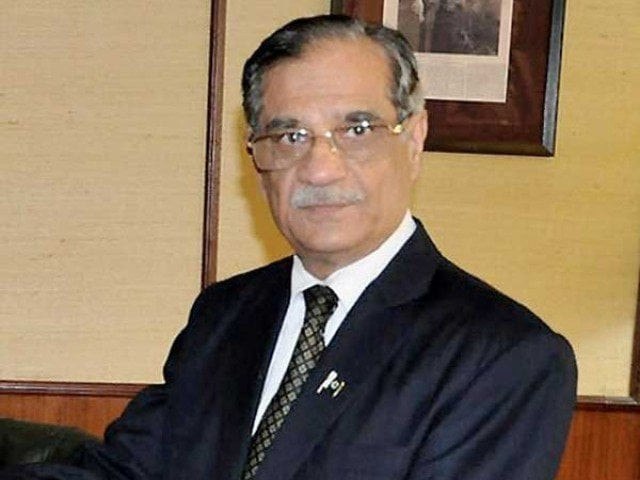CJP wonders how PTI can take i-voting credit
Makes a mention of PTI’s claim in lighter vein on two occasions

Makes a mention of PTI’s claim in lighter vein on two occasions.
PHOTO: FILE
Justice Nisar said it was the Supreme Court that granted the overseas Pakistanis the right to vote in the recently held by-elections “but credit is being taken by the PTI (Pakistan Tehreek-e-Insaaf) government”.
The CJP expressed these views twice on a lighter note in two different cases.
First, he spoke during the hearing of a case concerning non-availability of basic facilities in private hospitals. And then during the hearing of a suo motu case related to dual nationality of lawmakers, the chief justice told senior PTI leader Hamid Khan that the SC had given overseas Pakistanis the voting right but his government was taking credit for it.
In 1993, overseas Pakistanis were given the right to vote and it was made part of the Constitution. The expatriate community got their right to cast vote after 30 years of the promulgation of the 1973 Constitution.
The parliamentary committee on electoral reforms deliberated on this issue for five years since 2013 but could not reach a consensus on the issue of giving online voting right to overseas Pakistanis.
A three-member bench of the Supreme Court, headed by CJP Saqib Nisar and comprising Justice Aijazul Hassan and Justice Umar Atta Bandial, was hearing the case.
In a first, SC grants expats voting right
The petitioners were Imran Khan and Dr Arif Alvi – now Prime Minister and President respectively – and the overseas Pakistanis.
Later, the SC directed the National Database and Registration Authority (NADRA) to develop an internet voting solution to enable the overseas Pakistanis to cast vote from their respective country of residence.
During the proceedings of the case, the SC ordered a third-party technical audit of the i-voting system developed by NADRA. The third party's audit report, according to the final SC judgment, was generally positive and encouraging.
However, since the system had not been tried and tested, the honorable court decided to postpone the matter till the by-elections. It decided that the i-voting system would be tested as a pilot project during by-elections i.e. on a smaller scale.
The SC bench had, in its detailed verdict, expressed appreciations over the efforts of the Election Commission of Pakistan (ECP) and NADRA.
Following the SC verdict, the ECP launched the i-voting system in collaboration with NADRA for the October 14 by-elections.
A senior NADRA official revealed that the pilot testing was a great success story even though a very small number of overseas Pakistanis took part in the registration process.
“Lack of interest shown by overseas Pakistanis in the by-elections can be attributed to a number of factors, like it were the by-elections in which the level of public participation is generally very low. Besides, political parties too do not promote or publicise the idea of i-voting,” he said.
The official added that 70,364 overseas Pakistanis registered for i-voting and 6,233 of them cast their votes for National and provincial assembly candidates, with a turnout of over 84 percent.
He gave the full credit of the ‘successful’ exercise to Justice Nisar and the NADRA team headed by Chairman Usman Mobin who spent days and nights on the development of this project.



1724319076-0/Untitled-design-(5)1724319076-0-208x130.webp)















COMMENTS
Comments are moderated and generally will be posted if they are on-topic and not abusive.
For more information, please see our Comments FAQ